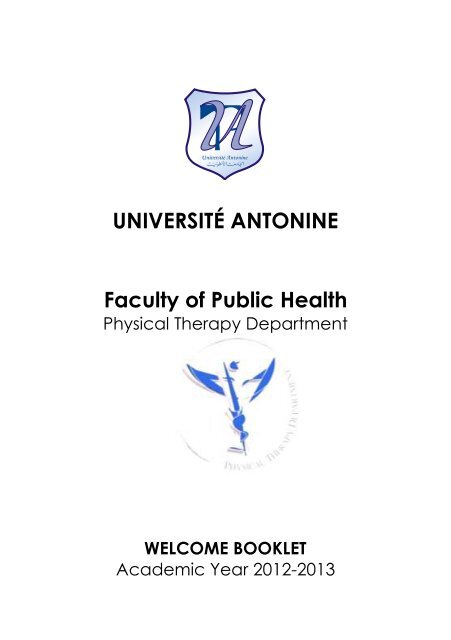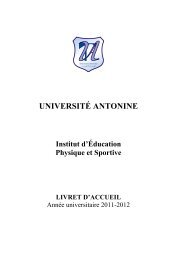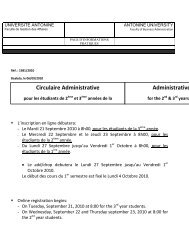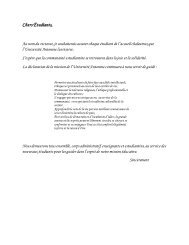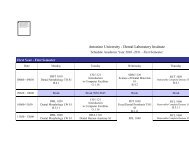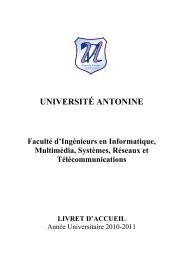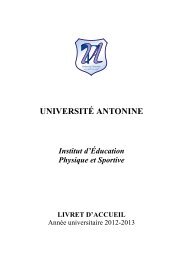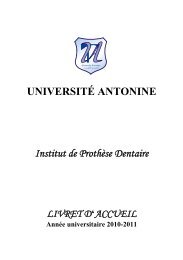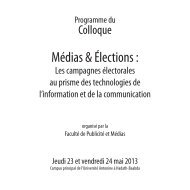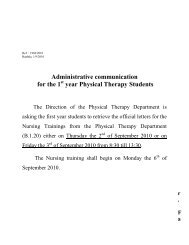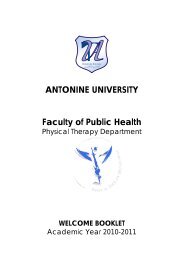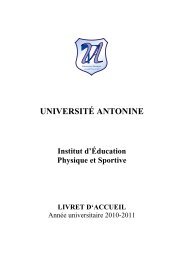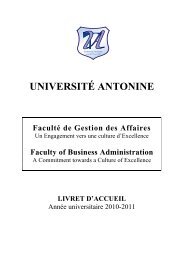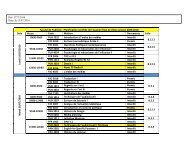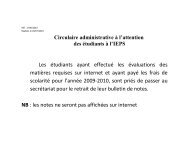Livret Physio 2012-2013.pdf - Université Antonine, UPA Liban
Livret Physio 2012-2013.pdf - Université Antonine, UPA Liban
Livret Physio 2012-2013.pdf - Université Antonine, UPA Liban
Create successful ePaper yourself
Turn your PDF publications into a flip-book with our unique Google optimized e-Paper software.
UNIVERSITÉ ANTONINE<br />
Faculty of Public Health<br />
Physical Therapy Department<br />
WELCOME BOOKLET<br />
Academic Year <strong>2012</strong>-2013
1. Welcome<br />
Our principal concern at the Physical Therapy<br />
Department has been to conceive an internationally<br />
recognized academic program. After a vast study of the<br />
current employment situation, the Faculty Administration<br />
judged necessary to build up a theoretical and practical<br />
studies program according to the academic and<br />
professional needs in Physical Therapy. Physical Therapy is<br />
an essential allied-health profession, as well as a<br />
knowledge field of motricity sciences, movement<br />
physiology and rehabilitation. The curriculum is made of<br />
practical and theoretical approaches based on sciences<br />
(basic, biomedical, human, motricity, etc.). The rigorous<br />
practical approach is the key of this academic<br />
curriculum.<br />
During the physical therapy studies, the acquisition of<br />
professional competences on the therapist-patient or<br />
therapy-sickness levels is essential. Moreover, the<br />
interaction of the physical therapist with a multiple<br />
disciplinary team will help build a strong auto criticism<br />
spirit.<br />
On the other hand, the Direction of the Physical<br />
Therapy department at the Université <strong>Antonine</strong> provides<br />
a four year program based on strong scientific<br />
knowledge along with mastering of professional<br />
techniques. That way, the students can understand the<br />
theories from which the practical techniques emerge.<br />
The four year program contents are divided as<br />
follows:<br />
- The first year primarily contains courses of basic,<br />
exact, biomedical and human.<br />
2
- In the second year, the student will learn the systems<br />
pathologies as well as the basic methods in physical<br />
therapy treatment. Physical therapy observational and<br />
practical training periods are included in the curriculum.<br />
- In the third year, the students will learn the specific<br />
techniques in physical therapy treatment and will be<br />
able to take a patient in charge. The practical trainings<br />
of the third year are distributed among hospitals and<br />
rehabilitation centers in Lebanon and abroad.<br />
- In the final (fourth) year, the student will learn<br />
advanced methods of rehabilitation in specific fields and<br />
will work on a research topic during the whole year to be<br />
able to write the memoir.<br />
This new program demonstrates the strong will of the<br />
Université <strong>Antonine</strong> to revalorize the Physical Therapy<br />
profession.<br />
Last but not least, all the staff of the Physical Therapy<br />
department of the Université <strong>Antonine</strong> welcomes the<br />
students and wishes them an excellent academic year<br />
<strong>2012</strong>-2013.<br />
Mr. Elie AKOURY<br />
Director of the Physical Therapy<br />
Department<br />
3
2. The <strong>UPA</strong> today<br />
L’Université <strong>Antonine</strong> est constituée de quatorze<br />
départements ou unités :<br />
- Six Facultés :<br />
1. Faculté des Sciences Théologiques et des<br />
Études Pastorales<br />
2. Faculté des Sciences Bibliques,<br />
Œcuméniques et des Religions<br />
3. Faculté d’Ingénieurs en Informatique,<br />
Multimédia, Systèmes, Réseaux et<br />
Télécommunications<br />
4. Faculté de Santé Publique<br />
5. Faculté de Gestion des Affaires<br />
6. Faculté de Publicité<br />
- Cinq Départements / Instituts:<br />
1. Département des Sciences Infirmières<br />
2. Département de <strong>Physio</strong>thérapie<br />
3. Institut d’Éducation Physique et Sportive<br />
4. Institut Supérieur de Musique<br />
5. Institut de Prothèse Dentaire<br />
- Centre, École et Académie :<br />
1. Centre de Langues et de Ressources<br />
2. École de Musique des Pères Antonins<br />
3. Laboratoire de recherche TICKET<br />
(Telecommunication, Information and<br />
Computer Key Enabling Technologies<br />
(TIKET))<br />
4. Académie régionale de « CISCO Systems »<br />
4
3. Who runs the <strong>UPA</strong>?<br />
« Sous le haut contrôle du Chancelier et du<br />
Comité Directeur Supérieur, l’Université <strong>Antonine</strong> est<br />
administrée par un Conseil ».<br />
Le Grand Chancelier : Révérendissime Père Abbé<br />
Daoud REAIDY, Supérieur Général de l’Ordre<br />
Antonin Maronite<br />
Le Conseil de l’<strong>UPA</strong> :<br />
Le Conseil de l’<strong>UPA</strong> est formé du Recteur qui<br />
en est le Président, du Vice-Recteur dont il est<br />
question à l’art. 48, du Secrétaire Général, de<br />
l’Administrateur, des Directeurs des Campus, des<br />
Doyens des Facultés, des Directeurs des<br />
Instituts/Départements, des Directeurs des<br />
Sections/Centres, de l’Aumônier de l’Université et un<br />
représentant délégué des étudiants par campus.<br />
- P. Germanos GERMANOS Recteur<br />
- P. Joe BOU JAOUDÉ Secrétaire Général<br />
- P. Antoine AZIZ Administrateur<br />
- Mlle Pascale LAHOUD Vice-Recteur aux Affaires<br />
Culturelles<br />
- M. Antoine YAZIGI Vice-Recteur aux Affaires<br />
Académiques et Internationales<br />
- P. Fadi MESSALLEM Directeur du Centre Universitaire<br />
de Zahlé-Békaa<br />
- P. Charbel ABI KHALIL Directeur du Centre Universitaire<br />
de Zghorta-<strong>Liban</strong> Nord<br />
- P. Joseph BOU RAAD Doyen de la Faculté des<br />
Sciences Théologiques et des<br />
Études Pastorales<br />
- Dr. Gaby MOUKARZEL Doyen de la Faculté de Santé<br />
Publique<br />
5
- Dr. Nidaa ABOU MRAD Directeur du Centre de Langues<br />
et de Ressources et Directeur de<br />
l’Institut Supérieur de Musique<br />
- Dr. Georges NEHMÉ Doyen de la Faculté de Gestion<br />
des Affaires<br />
- Dr. Mirna ABOU ZEID Doyenne de la Faculté de<br />
Publicité<br />
- Dr. Rony DARAZI Doyen de la Faculté d’Ingénieurs<br />
en Informatique, Multimédia,<br />
Systèmes, Réseaux et<br />
Télécommunications<br />
- Mme Mona NEHMÉ Directrice du Département des<br />
Sciences Infirmières<br />
- Mme Zeina MINA Directrice de l’Institut<br />
d’Éducation Physique et Sportive<br />
- M. Nabil EL ASMAR Directeur de l’Institut de Prothèse<br />
Dentaire<br />
- M. Elie AKOURY Directeur du Département de<br />
<strong>Physio</strong>thérapie<br />
- P. Toufic MAATOUK Directeur de l’École de Musique<br />
des Pères Antonins<br />
- P. Michel KHOURY Directeur de l’Institut de<br />
Formation des Formateurs<br />
- Mlle Maya NOHRA Directrice du Bureau<br />
d’Orientation et d’Admission<br />
- P. Joseph NAFFAH Directeur de la Seconde Section<br />
de la Faculté des Sciences<br />
Théologiques et des Études<br />
Pastorales, Karmsaddeh-<strong>Liban</strong><br />
Nord<br />
- M. Abdallah FICANI Directeur administratif du Centre<br />
Universitaire de Zahlé-Békaa<br />
- M. Maroun JNEID Directeur administratif du Centre<br />
Universitaire de Mejdlaya-<strong>Liban</strong><br />
Nord<br />
- P. Charbel DAOUD Aumônier Général<br />
- Un étudiant délégué par campus universitaire<br />
6
- Le Conseil de la Faculté de Santé Publique :<br />
Dr Gaby MOUKARZEL, M. Elie AKOURY, Mme<br />
Mona NEHMÉ, Mme Nancy WEHBÉ<br />
- Le Conseil du Département de <strong>Physio</strong>thérapie :<br />
Dr Gaby MOUKARZEL, M. Elie AKOURY, Mme<br />
Nancy WEHBÉ, Dr. Ahmad RIFAI SARRAJ, M.<br />
Charbel NAJEM<br />
- The task of the faculty board (council) / institute or<br />
department consists of helping the Dean / Director<br />
to accomplish all their essential functions.<br />
- The council meets at least once per month,<br />
according to a calendar fixed during the first<br />
meeting. Usually, the rectorship or the third of its<br />
members ask for a reunion.<br />
- Even if the rector is represented, a report should be<br />
delivered to the rectorate in not more than one<br />
week.<br />
- The faculties / institutes and teachers concerned<br />
by this issue can designate a delegate, according<br />
to an adequate procedure organized by the<br />
Dean / Director.<br />
- The same council will designate for the purpose a<br />
scientific committee. This committee can also<br />
regroup experts that are not part of the <strong>UPA</strong>.<br />
7
4. The <strong>UPA</strong> campuses<br />
The Université <strong>Antonine</strong> [<strong>UPA</strong>] is presented on a<br />
national level. It is currently comprised, of 3<br />
campuses:<br />
The main campus in Hadath – Baabda, next to<br />
the capital city, Beirut:<br />
• Faculty of engineering (Data processing,<br />
Multimedia, Systems, Network and<br />
Telecommunication)<br />
• Faculty of Theological Sciences and<br />
Pastoral Studies<br />
• Faculty of Public Health:<br />
‣ Nursing<br />
‣ Physical Therapy<br />
• Faculty of Management<br />
• Faculty of Publicity<br />
• Physical Education and Sports institute<br />
• Superior Institute of Music<br />
• Dental Prosthesis institute<br />
• Center of languages and resources<br />
• Music school (<strong>Antonine</strong> Fathers)<br />
• Regional academy of “Cisco systems”<br />
4 campuses in provincial regions:<br />
Scientific (Zahle – Bekaa):<br />
• Faculty of engineering (Data processing,<br />
Multimedia, Systems, Network and<br />
Telecommunication)<br />
• Faculty of Business Administration<br />
• Faculty of Publicity<br />
8
Scientific (Mejlaya – North Lebanon):<br />
• Faculty of engineering (Data processing,<br />
Multimedia, Systems, Network and<br />
Telecommunication)<br />
• Faculty of Business Administration<br />
• Music school (<strong>Antonine</strong> Fathers)<br />
Human and religious sciences (Dekwaneh):<br />
Biblical, ecumenical and religious sciences<br />
Human and religious sciences (Karmsaddeh –<br />
North Lebanon):<br />
• Theological sciences and pastoral studies<br />
Hadath – Baabda site contains 5 main buildings:<br />
- Building A: it is a polyvalent building. It<br />
contains:<br />
1- The rectorate<br />
2- The church<br />
3- The central library<br />
4- The students’ dorms<br />
5- The Louis Rohban meeting hall<br />
6- The photo studio of the Faculty of<br />
Publicity<br />
9
- Building B: the different units of Baabda site<br />
share the floors of this building:<br />
• Ground floor:<br />
Languages and resources center<br />
Orientation and Admission office<br />
Social services office<br />
Network administrator’s office<br />
University servers’ room<br />
• 1 st floor:<br />
Directorate of the Faculty of Public<br />
Health:<br />
o Nursing Department<br />
o Physical Therapy<br />
Department<br />
Directorate of the Physical<br />
Education and Sports Institute<br />
• 2 nd floor:<br />
Directorate of the Faculty of<br />
Engineering (Data processing,<br />
Multimedia, Systems, Network and<br />
Telecommunication)<br />
Offices of the responsible for the 4 th<br />
and 5 th years of study at the<br />
Faculty of Engineering<br />
Class rooms (courses and practical<br />
work)<br />
Faculty members and instructors’<br />
room<br />
Montage room of the Faculty of<br />
Publicity<br />
10
• 3 rd floor:<br />
Directorate of Dental Prosthetics<br />
Institute<br />
Amann Girrbach laboratory<br />
Class rooms and laboratories<br />
Radio studio of the Faculty of<br />
Publicity<br />
• 4 th floor:<br />
Directorate of theological sciences<br />
and pastoral studies<br />
Directorate of the Institute of<br />
Formation des Formateurs<br />
Class rooms<br />
Building C: this building contains Issam<br />
Fares “Center for technology” in addition<br />
to class rooms and laboratories of data<br />
processing, electronics, network systems,<br />
multimedia and telecommunication.<br />
• Ground floor:<br />
Auditorium<br />
Television studio of the Faculty of<br />
Publicity<br />
• 1 st floor:<br />
Cisco, Mackintosh, and Multimedia<br />
laboratories<br />
Office of the responsible for the 5 th<br />
year of study at the Faculty of<br />
Engineering<br />
Class rooms<br />
11
• 2 nd floor:<br />
Data processing, systems, network<br />
and multimedia laboratories<br />
Class rooms<br />
• 3 rd floor:<br />
Electronics and<br />
telecommunication laboratories<br />
Distance learning technology<br />
assessment laboratories<br />
Office of the responsible for the<br />
transfer files and professional<br />
programs (Cisco, etc.)<br />
Classrooms<br />
- Building D:<br />
• <strong>Antonine</strong> Music School<br />
• <strong>Antonine</strong> Superior Institute of Music<br />
- Building G: this new building is assigned to<br />
the Faculty of Business Management, and<br />
contains the cafeteria, an esplanade and<br />
common places of meeting<br />
• G-1:<br />
Library<br />
• Ground floor:<br />
Cafeteria<br />
Pastorale<br />
• 1 st floor:<br />
Offices of the responsible for the 1 st ,<br />
2 nd , and 3 rd years of study at the<br />
Faculty of Engineering<br />
Computer laboratory for the<br />
Faculty of Business Management<br />
12
Big hall<br />
Auditorium<br />
Classrooms<br />
• 2 nd floor:<br />
Directorate of the Faculty of<br />
Business Management<br />
Teachers’ room<br />
Meeting room<br />
Auditorium<br />
Classrooms<br />
• 3 rd floor:<br />
Directorate of the Faculty of<br />
Publicity<br />
Offices of the responsible of the<br />
departments of the Faculty of<br />
Publicity<br />
Auditorium<br />
Classrooms<br />
• 4 th floor:<br />
Dean’s office of the Faculty of<br />
Business Management<br />
Meeting room<br />
Classrooms<br />
Numbering of rooms:<br />
In order to find one’s way without problems, the<br />
establishment, offices, amphitheatres, class<br />
rooms, practical work rooms and laboratories,<br />
are identified by specific numbers that contain 3<br />
distinct numbers.<br />
Example:<br />
- B.2.3 means Building B, 2 nd floor, room 3<br />
C.1.4 means building c, 1 st floor, room 4<br />
13
5. The academic calendar <strong>2012</strong>-2013<br />
Courses start on October the 1 st , <strong>2012</strong>.<br />
First Semester:<br />
- Courses: from 01/10/<strong>2012</strong> until 21/12/<strong>2012</strong><br />
included.<br />
- Christmas Holidays: from 24/12/<strong>2012</strong> until<br />
01/01/2013 included.<br />
- Final Exams: from 07/01/2013 until 18/01/2013<br />
included.<br />
Second Semester:<br />
- Courses: from 18/02/2013 until 24/05/2013<br />
included.<br />
- Easter Holidays: from 28/03/2013 until 05/04/2013<br />
included and from 02/05/2013 until 06/05/2013<br />
included<br />
- Final Exams: from 03/06/2013 until 14/06/2013<br />
included.<br />
Holidays :<br />
- Fête de la Croix Glorieuse : 14 septembre<br />
- Adha (suivant le communiqué de l'État) : 26 octobre<br />
- Toussaint : 1 er novembre<br />
- Nouvel an de l'hégire (suivant le communiqué de l’État) : 15 novembre<br />
- Fête de l’indépendance du <strong>Liban</strong> : 22 novembre<br />
- Achoura (suivant le communiqué de l'État) : 24 novembre<br />
- Vacances de Noël et du nouvel an : 24 décembre au 1 er janvier inclus<br />
- Fête de l’épiphanie : 6 janvier<br />
- Fête de St. Antoine : 17 janvier<br />
- Naissance du Prophète (suivant le communiqué de l’État) : 24 janvier<br />
- Fête de St. Maroun : 9 février<br />
- Fête de l’Annonciation : 25 mars<br />
14
- Vacances de Pâques : 28 mars au 5 avril (inclus) et du 2 mai au 6 mai<br />
(inclus)<br />
- Fête du travail : 1 er mai<br />
- Fête Notre Dame du Printemps : 15 mai<br />
6. Schedules and teaching premises<br />
To get acknowledged with the premises, schedules,<br />
class rooms, practical work rooms and laboratories,<br />
go to:<br />
- Université <strong>Antonine</strong> site:<br />
http://www.upa.edu.lb<br />
- The notice board is located on the<br />
administrative floor of your faculty (B.1)<br />
If there is a course cancellation or a change in the<br />
rooms or in the schedule, you will be informed:<br />
- By the teacher during your courses<br />
And the information will be confirmed according<br />
to a circular posted up on a billboard. Usually the<br />
notice boards are found next to the<br />
administration office of each faculty (B.1).<br />
7. Your educational project<br />
The team is at your disposal all year long, in order to<br />
inform, orientate and accompany the students. Do<br />
not hesitate to ask for an appointment to see the<br />
person with regard to this matter in order to obtain<br />
answers to all your questions.<br />
15
8. Your pedagogical follow-up<br />
If you encounter difficulties during your studies, our<br />
team is at your disposal in order to accompany you<br />
and:<br />
- Help and improve your working methods,<br />
- Give you advice to go work in small groups or<br />
workshops,<br />
- Encourage practical work in laboratories.<br />
9. The Physical Therapy Department<br />
In order to succeed in your education, the team is<br />
destined to accompany you throughout your<br />
studies. The department is formed of the following<br />
individuals:<br />
Dean: Dr. Gaby MOUKARZEL<br />
Director: Mr. Elie AKOURY<br />
Assistant Director: Mrs. Nancy WEHBÉ<br />
10. The curriculum<br />
<strong>Physio</strong>therapy studies are based on mastering<br />
<strong>Physio</strong>therapy methods and rehabilitation. This<br />
practical formation rests on motility sciences, the<br />
meeting point between exact sciences, biomedical<br />
sciences and human sciences.<br />
16
Detailed program<br />
Bachelor of Physical Therapy (4 years = 129 credits)<br />
UNIVERSITY REQUIREMENTS<br />
Course name<br />
Credits<br />
Statistics 3<br />
Citizenship Education 1<br />
Physical Education and Sports 3<br />
Research Methods 3<br />
Supportive Tools for Learning 3<br />
English I 3<br />
English II 3<br />
TOTAL 19<br />
FACULTY REQUIREMENTS<br />
Course name<br />
Credits<br />
Health Management 2<br />
Exercise <strong>Physio</strong>logy 3<br />
Methods of Nursing Care 3<br />
General and Systemic Anatomy and<br />
<strong>Physio</strong>logy I 3<br />
General and Systemic Anatomy and<br />
<strong>Physio</strong>logy II 3<br />
Introduction to Biomechanics 3<br />
Ergonomics 3<br />
Disability Psychology 3<br />
Pathology I 3<br />
Pathology II 3<br />
Nutrition 1<br />
Pharmacology 1<br />
RED CROSS 2<br />
TOTAL 33<br />
17
SPECIALIZATION COURSES<br />
Course name<br />
Credits<br />
Introduction to Psychomotor Therapy 3<br />
Anatomy and <strong>Physio</strong>logy of the<br />
Musculoskeletal System 3<br />
Neuroanatomy and Neurophysiology 3<br />
Applied Biomechanics 3<br />
Motion Analysis 3<br />
Psychomotor Therapy 3<br />
Introduction to Physical Therapy & Patient<br />
Approach 3<br />
Traumatology and Medical imaging I 2<br />
Traumatology and Medical imaging II 2<br />
Physical Therapy Methods I 3<br />
Physical Therapy Methods II 3<br />
Physical Therapy Methods III 3<br />
Introduction to clinical posturology 1<br />
Methods of Physical Assessment and Muscle<br />
Testing I 3<br />
Methods of Physical Assessment and Muscle<br />
Testing II 3<br />
Physical Therapy Methods for the<br />
Musculoskeletal System I 3<br />
Physical Therapy Methods for the<br />
Musculoskeletal System II 3<br />
Cardiovascular and Pulmonary<br />
Rehabilitation 3<br />
Physical Therapy and Rehabilitation<br />
Methods in Rheumatology 3<br />
Physical Therapy Methods for the Nervous<br />
System I 3<br />
Physical Therapy Methods for the Nervous 3<br />
18
System II<br />
Physical Therapy and Rehabilitation<br />
Methods for Sports Injuries 3<br />
Professional Ethics, Laws and Regulations 2<br />
Biomaterials, Prosthetics and Orthotics 1<br />
Memoir 3<br />
Observational and Practical Trainings in<br />
Nursing Care, Physical Therapy and<br />
Rehabilitation 9<br />
TOTAL 77<br />
11. Fees and graduates<br />
Superior studies in relation with the department of<br />
<strong>Physio</strong>therapy allow students to obtain a degree in<br />
<strong>Physio</strong>therapy (University degree).<br />
12. Rules and Regulations<br />
You will find below an extract of the interior<br />
statute of the <strong>Physio</strong>therapy department:<br />
Interior statute’s frame and finality<br />
Article 1<br />
- §. 1. This interior statute is subordinated to<br />
the organic statute that regulates the life of the<br />
Université <strong>Antonine</strong>. This statute was promulgated by<br />
the council of the <strong>Antonine</strong> Order during the<br />
academic year 2006-2007.<br />
19
- §. 2. Subsidiary to such a statute, this<br />
present regulation aims to apply, where the<br />
<strong>Physio</strong>therapy Department is concerned, the<br />
general provisions of this following statute; we refer<br />
particularly to the articles 30, 31, 34, 85, 88, 111 and<br />
163 § 2 of the organic statute mentioned before.<br />
Article 2 - The present statute comes into effect<br />
while all the employees of the department in<br />
question are concerned, such personnel is formed<br />
of the Administration of the <strong>Physio</strong>therapy<br />
Department, its students, the teachers and people,<br />
whatever their job is, carry out a specific function or<br />
exercise, some activity related to the frame and the<br />
premises of the department in question.<br />
Article 3<br />
- §. 1. The Department’s memos which<br />
emanate from the university’s academic authority<br />
form, with full power, adjunctions to the present<br />
statute. In this case it is not contingent but notes<br />
bearing the general and permanent for the life of<br />
the academic unit concerned. Such notes will be<br />
applied immediately upon completion of the<br />
formalities prescribed by law.<br />
- §. 2. However the provisions and guidelines,<br />
which have a degree of urgency or emergency,<br />
take effect immediately. It is exclusive to those<br />
relating to security, common good, public order and<br />
hygiene which are made necessary by an<br />
exceptional situation. The coming into effect of such<br />
20
provisions is not bound by any process. It does not<br />
follow any routine formality.<br />
- §. 3. If the provisions referred to in<br />
paragraph 1 usually come in writing, those<br />
contemplated by § 2 may be, if any, only oral.<br />
General Discipline<br />
Article 4<br />
- §. 1. Every act capable of breaching the<br />
good functioning of teaching is forbidden.<br />
- §. 2. It is also forbidden to:<br />
- Talk or have fun during courses ;<br />
- Take care of something else during<br />
teaching hours apart from paying<br />
attention to the course or accomplishing<br />
university tasks that are required ;<br />
- Eat, drink or chew during lessons and<br />
practical work ;<br />
- Smoke in classrooms, laboratories,<br />
corridors or stairs ;<br />
- Use the mobile phone or have it in<br />
working premises ;<br />
- Take out material or documents from the<br />
department without written<br />
authorization ;<br />
- Move about in working premises during<br />
teaching hours ;<br />
- Distribute printed books or paper, or<br />
leaflets without authorization unless they<br />
21
are in relation with identified legal or<br />
conventional prerogatives ;<br />
- Lacerate posters or ruin posters or notes<br />
placed on boards reserved to the<br />
direction or the students’ representatives ;<br />
- Write down or post up things outside<br />
cases foreseen by provisions related to<br />
students’ representatives.<br />
- §. 3. Students must respect the environment<br />
in which they move around in addition to nature,<br />
premises, furniture, material, etc… and before<br />
anything else, with who they share the educational<br />
surrounding. Every act of vandalism is followed by<br />
indemnification and amends in terms of the caused<br />
damage.<br />
- §. 4. No association or group of persons or<br />
individuals is permitted to take measures on the<br />
suspension, the cessation or postponement of<br />
meetings (courses, TD and TP). Only the leadership<br />
of the <strong>UPA</strong> is the competent authority for the<br />
adoption of administrative and academic<br />
communications in the form of circulars. In the<br />
absence of compliance with the foregoing, the<br />
individual (s) person (s) in question (s) may (will)<br />
administer penalties.<br />
- §. 5. The compositions in relation with the<br />
mid term exams are given back to students. The<br />
mid year final exams are kept in the general<br />
secretariat as the university’s property in<br />
accordance with the Lebanese law taken into<br />
22
effect. The student who wishes to look at his/her<br />
composition of the mid-year final exam within one<br />
week following the online grades publication, may<br />
risk a sanction of -5/20, if the grade turns out to be<br />
correct or if there is no error while counting the<br />
grades. Otherwise, the student benefits from the<br />
formal rectification of his/her grade. There is no<br />
possibility, no matter the case, after looking at the<br />
composition, to ask the teacher for a second<br />
correction of the exam.<br />
Organization of lessons<br />
Article 5<br />
- §. 1. The studies are the raison d'être of<br />
the faculty, staff, its premises and its equipment.<br />
The life of the Faculty is organized for this primary<br />
purpose and will safeguard the success and<br />
smooth functioning of their studies.<br />
- §. 2. Each person should scrupulously avoid<br />
anything that might prejudice the effectiveness<br />
of education or constitute an obstacle to their<br />
normal course of study.<br />
Article 6<br />
- §. 1. The establishments of the curriculum,<br />
the distribution of the schedule, the identity of<br />
course, use of time and consistency of the subjects<br />
taught, are the exclusive ownership of the<br />
academic authorities.<br />
23
- §. 2. It is clear that in exercising its functions<br />
under Section 1, the Department of the Faculty will<br />
be anxious to comply strictly with the requirements<br />
of Public and governmental bodies in this area.<br />
Assiduity and Delay<br />
Article 7 – In the <strong>Physio</strong>therapy department, as it is in<br />
all other units dependent on the Université <strong>Antonine</strong>,<br />
assiduity is a must. All students are asked to<br />
participate in a personal and active way in all<br />
academic activities foreseen by the statute.<br />
Article 8<br />
- §. 1. Every absence must be justified by a<br />
report or a serious excuse.<br />
- §. 2. Should the student be absent from any<br />
courses / TP / TD and the absence is permitted for<br />
working reasons, the combinations of justified<br />
absences can not exceed 50%. Otherwise, the<br />
student will be denied the right to pass the final<br />
exam in (the) subject (s) in question.<br />
The excuse presented must be updated at the<br />
beginning of each semester.<br />
The Department of the Faculty is required to comply<br />
strictly with the requirements of the public and<br />
governmental bodies in this area. Nevertheless, 50%<br />
absences are not allowed for practical courses.<br />
- §. 3. The department’s direction is the sole<br />
competent power with the right to judge the validity<br />
of excuses and the reliability of the report<br />
24
mentioned in the previous paragraph; it is open to<br />
the direction to send for, should the occasion arise,<br />
a doctor or an expert in order to verify the validity of<br />
the pleaded excuses.<br />
Article 9<br />
- §. 1. Attendance is mandatory in all classes<br />
(lectures, practice sessions, trainings, etc.), and must<br />
be respected by students.<br />
- §. 2. Attendance is seriously considered in<br />
the Physical Therapy department. Each student is<br />
allowed to skip 3 sessions per credit = 34% of the<br />
expected numbers of sessions of the total course.<br />
Any further absence must be justified and accepted<br />
by the Administration. Under any condition, a<br />
student who has missed more than 50% of the<br />
course will not be allowed to present the final exam,<br />
and he/she will have to repeat the course again.<br />
- §. 3. Derogation claims must be deposited<br />
at the General Secretariat of <strong>UPA</strong> at the latest on<br />
the 12 th of November <strong>2012</strong> for the 1 st semester and<br />
on the 11 th of March 2013 for the second semester.<br />
Each case will be examined alone and the<br />
concerned students will receive a written letter<br />
relating to the final decision of the General<br />
Secretary.<br />
Assiduity being the rule, derogations will be<br />
given within limits.<br />
- §. 4. Any late entry to class (more than 10<br />
minutes since the beginning of the lecture) will be<br />
considered as half an attendance, unless<br />
25
mentioned otherwise by the teacher in charge.<br />
After 15 minutes of the beginning of the lecture, the<br />
student may be admitted to class only if the teacher<br />
allows it, but no attendance will be counted.<br />
- §. 5. Excuses and medical reports must be<br />
presented the day after absence day and they<br />
should be given to the General Secretariat. The<br />
refusal or approval of the medical excuse / report<br />
will be communicated to the student in question in<br />
writing. Every document presented after the<br />
abovementioned delay is seen as invalid.<br />
Article 10<br />
- §. 1. During the end of the year<br />
deliberations, all these irregularities will be taken into<br />
consideration.<br />
- §. 2. Attendance is graded. The grade<br />
constitutes 10% of the total grade of any<br />
given course. The grades are distributed as<br />
follows: Above 75%, the grade is calculated<br />
by dividing the percentage by ten. Below<br />
75%, the grade is calculated by dividing the<br />
percentage per twenty. For example:<br />
100% attendance = 10 points<br />
90% = 9 points<br />
80% = 8 points<br />
70% = 3.5 points<br />
60% = 3 points<br />
50% = 0 point<br />
26
- §. 3. Academic authority has the power to<br />
determine and define the topics mentioned in the<br />
previous paragraph.<br />
Article 11<br />
- §. 1. When it is about a prolonged absence<br />
without justification and authorization, the student is<br />
seen as resigning from the course; he/she will not be<br />
able, whatever the issue may be, to change the<br />
formation process concerned or during their possible<br />
reinstatement.<br />
- §. 2. If the teacher has expelled the student<br />
3 times from the same course, he/she will be<br />
considered as resigning.<br />
Article 12<br />
- §. 1. Each missed minute during a training<br />
session, no matter the reason, must be recovered at<br />
the same training place. The total number of hours<br />
of training must be fully accomplished at the same<br />
training place.<br />
- §. 2. The student must notify the responsible<br />
person at the training place as well as the<br />
responsible person designated by the university<br />
about every late arrival and every absence to a<br />
training session, before the beginning of the training<br />
that day.<br />
27
- §. 3. If the absence is justified and<br />
authorized, the missed hours will be recovered at<br />
100%: 1 recovery hour for every hour missed. If the<br />
absence is not justified nor authorized, every missed<br />
hour will be recovered at 200%: 2 recovery hours for<br />
every missed hour. The recovered hours of training<br />
are marked on a special red sheet and should be<br />
done during week-ends before the end of the<br />
training period.<br />
- §. 4. It is the duty of the student to follow the<br />
recommendations and directions of the person in<br />
charge at the training place, in accordance with<br />
the training targets set by the Physical therapy<br />
department at the Université <strong>Antonine</strong>.<br />
- §. 5. The student has to take relevant notes,<br />
observe, practice and learn, according to the level<br />
of the training and the specific objectives. It is the<br />
student’s duty - and the supervisor’s responsibility - to<br />
use the training time for the best of the learning<br />
experience.<br />
Article 13<br />
- §. 1. The department’s administration is the<br />
one to fix the courses and scheduled academic<br />
activities<br />
- §. 2. The department’s direction reserves<br />
oneself the right to modify the schedule should the<br />
occasion arise, during the academic year.<br />
Consequently, students should be available<br />
between 7h30 and 20h00 with a view to possible<br />
28
modifications of the schedule, between Monday<br />
and Saturday.<br />
- §. 3. Students, teachers or accompanists<br />
should be present on the premises 10 minutes before<br />
the foreseen time to begin the activity in question.<br />
- §. 4. Latecomers are considered absent<br />
unless they present a request to the General<br />
Secretary during the same day and the request<br />
must be accepted by this instancy.<br />
Article 14 - When the concerned student is a minor,<br />
the person to communicate with the administration<br />
is in all cases, the guardian of the minor in question.<br />
Article 15 - Teachers are sovereigns during their<br />
teaching sessions. They cannot be bothered nor can<br />
they be objects to shameful actions. Dialogue<br />
between the teacher and the student remains a<br />
main value within the ethical system of the <strong>UPA</strong>.<br />
Consequently it is after the teaching session (course,<br />
TD or TP) that the student has the right to ask for<br />
explanations in relation with the teacher’s decision<br />
with respect to the situation in question. The<br />
department’s administration remains the instance<br />
entitled with the continuation of the dialogue.<br />
Students<br />
Article 16 - Students are given the right to insist on<br />
having a solid and adequate education.<br />
29
Article 17 - Students should follow the statutes and<br />
regulations prescriptions of the university in addition<br />
to disciplinary and academic provisions in relation<br />
with the competent authorities. Furthermore,<br />
students are required to observe discipline, course<br />
assiduity, regular assessments and exams<br />
participation.<br />
Article 18 - The student who has decided to follow<br />
our university courses must accept its regulations,<br />
social objectives, finality and spiritual, academic<br />
and juridical situation.<br />
Article 19 - Registration application constitutes, in all<br />
effects, a formal engagement of the candidate or<br />
his/her legitimate tutor to respect university its<br />
institutions statutes and regulations and to abide by<br />
them.<br />
Article 20<br />
- §. 1. Applications for registration must be<br />
submitted by the candidate on time and according<br />
to the predetermined regulations by the<br />
administration.<br />
- §. 2. The administration above-mentioned in<br />
§ 1, will be anxious not to let its prescriptions depart<br />
from the provisions taken by the university in general.<br />
Article 21<br />
- §. 1. Under the assumption that students are<br />
responsible for their own actions, the <strong>UPA</strong> does not<br />
30
discriminate by religion, race, sex or social status.<br />
The student is judged only by conditions of conduct<br />
and a satisfactory legal situation, and to state in<br />
advance of a level of education which empowers<br />
him/her to profit from the education they receive by<br />
<strong>UPA</strong>.<br />
- §. 2. The <strong>UPA</strong> is entitled to require for<br />
admission of a candidate, a probationary test for<br />
admission. The object is to ensure the assimilative<br />
capacity and expression in the languages of<br />
instruction.<br />
Article 22 - A student’s admission can only be at the<br />
beginning of the academic year.<br />
Article 23 - Registration bestows the quality of<br />
student in the Université <strong>Antonine</strong>.<br />
Article 24 - All students are under the jurisdiction of<br />
the Rector, the university’s council and the<br />
department’s director. They are subordinated to the<br />
university’s and department’s discipline.<br />
Article 25 - Students are not allowed to leave class<br />
before the end of the course, unless they have the<br />
express authorization of the direction.<br />
Article 26 - Registration entitles the student the right<br />
to have the student’s card of the year according to<br />
the format established by the direction.<br />
31
Article 27<br />
- §. 1. The presentation of the student card<br />
may be required at any time at the university.<br />
- §. 2. The card is particularly important during<br />
exam admission or communication with the General<br />
Library of the university or one of its units regarding<br />
books taken or received. The exhibition of the card<br />
may be required for participation in any student<br />
activity. In some circumstances, the university may<br />
even require students’ exhibition of the card to<br />
access the premises of the university.<br />
13. Fees and exams<br />
Continuous assessment of knowledge and exams<br />
Article 28 – The rules in relation with knowledge<br />
assessment, test and exams aims at allowing the<br />
validation of the student’s acquired knowledge and<br />
the necessary accompaniment in order to form<br />
competent people capable of answering the<br />
expected needs.<br />
Article 29 – The Evaluation process consists of<br />
continuous assessment and of an exam at the end<br />
of each semester.<br />
Article 30 – During each test, students will be<br />
informed if they are authorized or not to use<br />
documents. By default, documents are prohibited.<br />
32
Article 31<br />
– §. 1. During tests, candidates must occupy<br />
the place that has been assigned for them.<br />
Communication with colleagues or other people is<br />
strictly forbidden. It is also forbidden, during tests, to<br />
borrow material or tools. Communication is allowed,<br />
only through the authorized personnel.<br />
- §. 2. During tests, candidates are not<br />
allowed to use mobile phones or any other means<br />
of communication; not only the use of such<br />
instruments is forbidden but also its presence with<br />
the students.<br />
- §. 3. Infraction of these rules risks the<br />
invalidation of the test and the exposure of both the<br />
guilty and his/her accomplice to expulsion.<br />
Article 32 - Tests may include all chapters students<br />
have studied since the beginning of the current<br />
academic year. Tests may be given in different<br />
forms according to the professor preferences;<br />
therefore students must be well prepared to all<br />
eventual questions. Hence, the final exam of a<br />
practical course is practical.<br />
Article 33<br />
- §. 1. Special permissions are given for second<br />
session of exams. The students are required to<br />
register by paying $50 for each failed course.<br />
33
In case of absence, the grade will be zero.<br />
The date of the second session will be scheduled by<br />
the Direction of the department.<br />
The courses in the second session will be<br />
graded at 80%, those 80% will be added to the 20%<br />
of the total grade of the exams done during the<br />
semester.<br />
The second session for practical courses is a<br />
practical exam.<br />
- §. 2. From the academic years 2003-2004<br />
onwards, courses that are not validated beforehand<br />
will be accounted for, according to the credits<br />
system (120$/credit), and the student should attend<br />
the course in question, even if this procedure<br />
deprives him of attending another course decided<br />
for this year.<br />
- §. 3. Students are to abide by the regular<br />
norms as for their financial situation. They are<br />
required when their financial contract expires, to<br />
confirm their current situation to the administration. If<br />
not, they risk being penalized academically as well<br />
as have disciplinary measures taken against them.<br />
Failing more than 3 main courses planned for<br />
the semester will lead to the student repeating their<br />
year.<br />
Article 34<br />
- §. 1. The objective of monitoring is to measure<br />
the achievements and assimilation of knowledge by<br />
34
the student(s). The objective of continuous tests is to<br />
measure knowledge assimilation of the student in<br />
addition to their experience.<br />
- §. 2. Therefore, the Department can schedule<br />
events in advance and ask the teacher to test at<br />
the end of each chapter the level of assimilation of<br />
the student(s).<br />
Article 35 - To succeed, the required grades are: 75<br />
over 100 for trainings and the Memoir; 70 over 100<br />
for specialization courses; 60 over 100 for faculty<br />
requirements courses and 50 over 100 for university<br />
requirements courses.<br />
Article 36 - It is recommended that teachers<br />
prepare one unplanned quiz each semester. The<br />
grade can be added to the continuous tests and<br />
considered as a bonus. Exceptions remain, as for the<br />
percentage, when there is a written assignment<br />
related to a theoretical course.<br />
End of semester exam<br />
Article 37 - At the end of each semester, there is a<br />
final exam. Dates are planned beforehand and<br />
published by the administration at the beginning of<br />
each academic year. The administration is entitled<br />
to modifying the dates of the exams that appear on<br />
a calendar.<br />
Article 38 - The grades for the practical and<br />
theoretical courses are distributed as follows:<br />
35
- 40% final exam of the semester<br />
- 25% projects and quizzes<br />
- 25% continuous examinations<br />
- 10% attendance<br />
If the professor chooses to make only two<br />
evaluations of the course, the grades are distributed<br />
as follows:<br />
- 50% final exam of the semester<br />
- 40% continuous examinations<br />
- 10% attendance<br />
The administration of the Physical Therapy<br />
department, in accordance with the professors, can<br />
modify these distributions and communicate the<br />
changes to the students at the beginning of each<br />
semester for each course.<br />
Article 39<br />
- §. 1. For each course, the total of the grades<br />
obtained from the continuous tests added to those<br />
of the end of the semester, are over 100.<br />
The total sum of every semester is calculated<br />
according to the following formula:<br />
- §. 2. For theoretical courses:<br />
40% final exam of the semester + 25% projects and<br />
quizzes+ 25% total continuous examinations + 10%<br />
attendance.<br />
36
- §. 3. For practical courses:<br />
40% final exam of the semester + 25% projects and<br />
quizzes+ 25% total continuous examinations + 10%<br />
attendance.<br />
GENERAL RULES AND REGULATING FOR<br />
CONTINUOUS AND FINAL EXAMS<br />
Before…<br />
1- 1- Are strictly prohibited in exam rooms:<br />
Hand or backpacks<br />
Documents (unless mentioned otherwise)<br />
Mobiles<br />
Snacks<br />
Drinks (except for water)<br />
2- Students coming late cannot enter without the<br />
permission of the Secretary General.<br />
3- Students who failed to undergo mid-term or final<br />
exams because of health problems must show a<br />
medical report issued only by the university,<br />
signed by Doctor Gaby Moukarzel, other reports<br />
are not accepted<br />
In the classroom…<br />
4- Students are advised to:<br />
Take the place indicated by the invigilator,<br />
Present their ID card of the current year.<br />
5- It is strictly prohibited to:<br />
Talk about any subject with teachers or<br />
invigilators,<br />
Argue with the invigilator regarding any<br />
decisions taken,<br />
Borrow materials from colleagues<br />
37
Any communication with a third party must<br />
go through the authorized invigilator.<br />
6- It is strictly unacceptable to:<br />
Smoke,<br />
Leave the room temporarily,<br />
Exchange work materials (calculators, rulers,<br />
erasers),<br />
Give back the paper within the first 30<br />
minutes of the examination.<br />
Any attempt to cheat is punished by the having the<br />
exam paper taken away and may lead to the<br />
cancellation of all exam sessions for the student –<br />
this includes the possibility of standing before the<br />
disciplinary council<br />
7a- Any recording or writing on documents<br />
admitted for test such as books, codes, etc ... will be<br />
considered as attempted fraud, and therefore liable<br />
to the same penalties mentioned above.<br />
8- When the student finishes his/her exam, they<br />
signal to the supervisor. The latter takes the paper<br />
and allows them to leave. While waiting for<br />
permission to leave, the student must sit silently in<br />
his/her place. This rule is equally applicable at the<br />
end of examination.<br />
9- Unless otherwise mentioned, students shall only<br />
use blue or black ink while writing their mid or final<br />
exams. Any failure to do this will be considered as<br />
cheating.<br />
38
10- Once the student is admitted to the examination<br />
classroom and has taken possession of the<br />
examination sheet, he/she can no longer invoke<br />
his/her right to take the make up exam, no matter<br />
the reason.<br />
When leaving …<br />
11- Students are urged to:<br />
o Leave silently,<br />
o Evacuate rapidly down the lobbies and<br />
stairs.<br />
12- Students can check their final exam grades<br />
before the General Secretariat as per article 4.4<br />
within one week from the online communication of<br />
the semester results.<br />
Training grade<br />
Article 40 – The training grade is calculated as<br />
follows:<br />
Practical training: practical exam 50% + training<br />
report 25% + evaluation of the trainer 25%<br />
Students must present a training report for each<br />
period of training; within one week from the end of<br />
each training period.<br />
Article 41:<br />
- §. 1. Students must accomplish their training in<br />
time, following the way mentioned by the<br />
administration.<br />
39
- §. 2. During training, students must follow the<br />
instructions of the head of the care service<br />
regarding tasks or general behavior.<br />
- §. 3. In training establishments, students must<br />
observe the same obligations of personnel in care<br />
services especially professional secrecy and<br />
discretion.<br />
- §. 4. Any leave, even justified ones are to be<br />
compensated on Saturdays or Sundays.<br />
- §. 5. Training starts at 8 A.M and ends at 12<br />
A.M. If it is full time, it starts at 8 A.M and ends at 16<br />
P.M. The Trainee must sign the attendance sheet at<br />
the time of checking in and out. At the end of the<br />
training, the head of service and supervisor makes<br />
an evaluation of the students’ attendance. During<br />
full time training, the trainee is entitled to a 30<br />
minute break.<br />
- §. 6. Students must wear convenient clothes<br />
and strictly follow the rules. They must keep the<br />
internal and external premises clean.<br />
- §. 7. Clothing must be appropriate, white<br />
blouse and trousers, name tag, white shoes, short or<br />
tied up hair, no jewelry, no nail polish, discreet make<br />
up, neck watch for vital signs.<br />
- §. 8. Trainee cannot change imposed training<br />
place without the permission of the head of the<br />
service.<br />
40
- §. 9. Is prohibited during training:<br />
Visits outside the fixed service,<br />
Going to the cafeteria,<br />
Receiving third parties,<br />
Visiting patients at other services,<br />
City clothes or short wear,<br />
Wearing the white uniform outside the<br />
hospital.<br />
Memoir<br />
To obtain the B.S in Physical Therapy diploma, the<br />
student must accomplish a complete bibliographic<br />
or experimental research work. The student must<br />
write a memoir and defend it in front of a jury of<br />
specialists.<br />
If failing, the student has to register as a fourth year<br />
student and present his work the following year<br />
during the period designated for defending<br />
memoirs. Nevertheless, exceptions can be made<br />
upon the request of the <strong>UPA</strong> Administration for<br />
allowing special students to present their work<br />
beforehand, thus during the first semester of the<br />
academic year.<br />
If the success does not occur during the two<br />
academic years following the initial registration, the<br />
student has then to change the subject of his thesis<br />
and register as a 4 th year student. Furthermore, if the<br />
methodology used for thesis presentation has been<br />
updated, the new work has to be submitted<br />
according to the prevailing methodology.<br />
41
Additionally, the student shall have to retake the<br />
Research methods course.<br />
14. Practical information<br />
Constituted on a green and panoramic field, the<br />
campus overlooks the capital of Beirut. It is located<br />
at the brink between mountain and city. It offers<br />
several facilities to students such as:<br />
Chapel,<br />
Infirmary,<br />
Library,<br />
Cafeteria,<br />
Associative space for physical and sport<br />
education<br />
Infirmary, library and cafeteria<br />
In addition to the administration, the A<br />
building includes the chapel and library. The B<br />
building includes the infirmary and the cafeteria<br />
occupies the ground floor of the building G.<br />
Physical and sports activities<br />
Students of the Université <strong>Antonine</strong> have the<br />
possibility to practice at least one sport activity in<br />
complete harmony with Physic and Sport Education<br />
Institute.<br />
1. Athletics and Football are practiced in the big<br />
stadium TF1,<br />
2. Basket-ball and Volley-ball are played in the<br />
covered field or at the Basket-ball field TB1,<br />
42
3. Gymnastics are done at the gymnasium D11,<br />
4. Judo takes place at Dojo: room E.O.1,<br />
5. Swimming occurs in the swimming pool<br />
15. For further information:<br />
For more information, you can consult <strong>UPA</strong> website:<br />
1) http://www.upa.edu.lb<br />
2) Notice boards<br />
3) The General Secretariat<br />
4) Your administration.<br />
16. Conferences and events<br />
During the academic year, conferences,<br />
symposiums and events are organized in order to<br />
allow people to meet industry and market leaders.<br />
We are asked to participate actively to these events<br />
organized by the university. Detailed programs of<br />
the events will be communicated through the<br />
billboard and the conferences rubric of the<br />
university’s internet site. Visit the address: http://<br />
www.upa.edu.lb<br />
43
17. Schedule<br />
Please visit the website: http://www.upa.edu.lb/phy<br />
Calendar of the Physical Therapy student<br />
Sports events for the academic year <strong>2012</strong>-2013<br />
44
Major Scientific Events for the<br />
academic year <strong>2012</strong>-2013<br />
45


